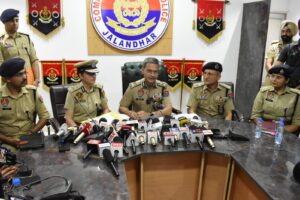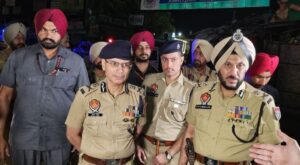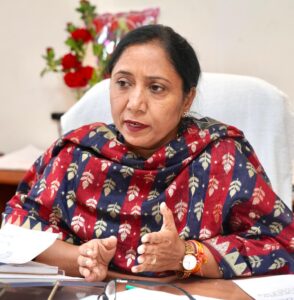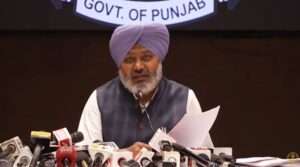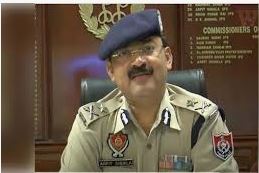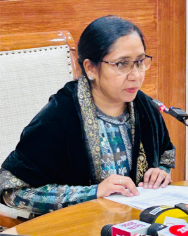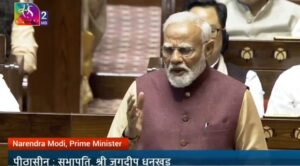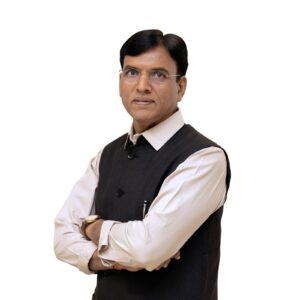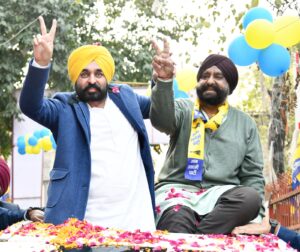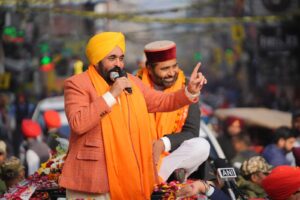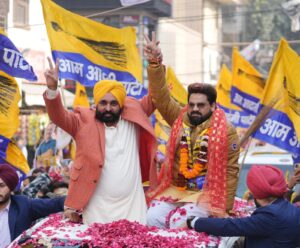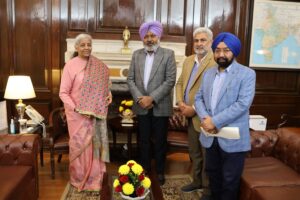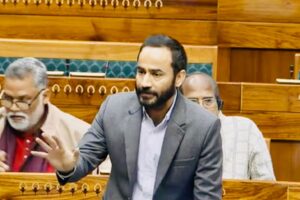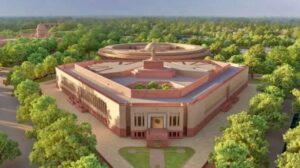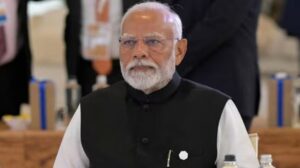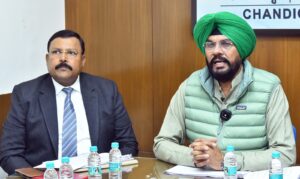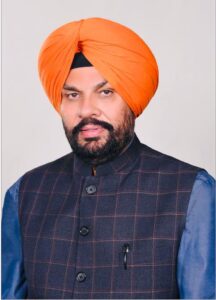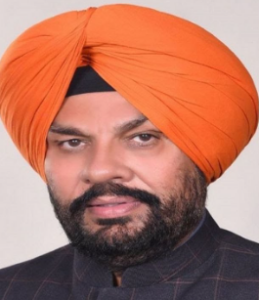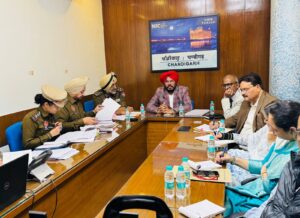The middle class is confident and determined to drive India’s journey towards development: PM
The Prime Minister, Shri Narendra Modi replied to the Motion of Thanks on the President’s Address to Parliament in the Rajya Sabha today. Addressing the House, the Prime Minister remarked that the President’s address covered India’s achievements, global expectations from India, and the confidence of the common man in building a developed India. He remarked that the President’s speech was inspiring, impactful, and provided guidance for future work. He expressed his gratitude to the President for the address.
Shri Modi said that over 70 honorable MPs have enriched the motion of thanks with their valuable thoughts. He noted that discussions took place from both sides, with everyone explaining the President’s address based on their understanding. The Prime Minister mentioned that a lot has been said about Sabka Saath, Sabka Vikas, and he found it difficult to understand the complexities involved. He emphasized that Sabka Saath, Sabka Vikas is our collective responsibility, and that’s why the country has given them the opportunity to serve.
Thanking the people of India for giving them the opportunity to serve them continuously since 2014, Shri Modi said this was a testimony to our model of development which has been tested, understood and supported by the people. He added the phrase ‘Nation First’ signified their model of development and this was exemplified in the policies, schemes and actions of the Government. Noting that there was a need of alternate model of governance and administration after a long hiatus of 5 – 6 decades after independence, Shri Modi said that country has received an opportunity to witness a new model of development, since 2014, based on satisfaction (Santushtikaran) over appeasement (Tushtikaran).
“It has been our earnest effort to ensure optimum utilization of the resources in India”, said the Prime Minister. He added that to ensure that the time of India was also not wasted but utilized for the development of the nation and the welfare of the people. Therefore, he added, “We have adopted the Saturation Approach”. He remarked that the motive behind the approach was to ensure 100% benefits to the true beneficiaries of the scheme. Highlighting that the true spirit of “Sabka Saath, Sabka Vishwas” has been implemented on the ground in the past decade, Shri Modi said that it is now evident as the efforts have led to the fruition in the form of development and progress. “Sabka Saath, Sabka Vishwas is the main mantra of our Governance”, he added. The Prime Minister emphasized that the Government had shown its commitment by strengthening the SC, ST Act which would empower the poor and the tribals by enhancing their respect and security.
Lamenting that there is a lot of effort being made in today’s time to spread the poison of casteism, the Prime Minister reminded that for the past three decades, OBC MPs from various parties of both houses have been demanding constitutional status for the OBC Commission. He added that it was their Government that granted constitutional status to the OBC Commission. He highlighted that the respect and honour of the Backward Classes was also important for their Government as they worship 140 crore Indians.
Remarking that whenever the topic of reservation has arisen in the country, efforts to solve the problem in a robust manner have not been undertaken, Shri Modi highlighted that in every instance, methods to divide the country, create tension, and foster enmity against each other were adopted. He emphasized that similar approaches were used even after the country attained independence. The Prime Minister highlighted that for the first time, his government presented a model inspired by the mantra of Sabka Saath, Sabka Vikas, providing nearly 10% reservation for the economically weaker sections without any tension or deprivation. He stated that this decision was welcomed by the SC, ST, and OBC communities, with no one expressing any discomfort. The Prime Minister noted that the implementation method, based on the principle of Sabka Saath, Sabka Vikas, was carried out in a healthy and peaceful manner, leading to nationwide acceptance of the decision.
Highlighting that Divyangs or specially-abled individuals in the country have not received the attention they deserve, the Prime Minister highlighted that under the mantra of Sabka Saath, Sabka Vikas, his Government has extended reservation for the differently-abled and worked in mission mode to provide facilities for them. He mentioned that numerous welfare schemes have been created and implemented for the benefit of specially-abled individuals. Furthermore, Shri Modi emphasized the efforts made for the legal rights of the transgender community, highlighting the commitment to ensuring their rights through robust legal measures. He remarked that the Government’s approach to Sabka Saath, Sabka Vikas is demonstrated through their compassionate consideration towards marginalized sections of society.
“India’s progress is powered by Nari Shakti”, exclaimed Shri Modi. He highlighted that if women are given opportunities and become part of policy-making, it can accelerate the country’s progress. He remarked that this is why the Government’s first decision in the new Parliament was dedicated to the honor of Nari Shakti. Shri Modi pointed out that the new Parliament will be remembered not just for its appearance but for its first decision, which was a tribute to the Nari Shakti. He stated that the new Parliament could have been inaugurated differently for the sake of praise, but instead, it was dedicated to the honor of women. He highlighted that the Parliament has commenced its work with the blessings of Nari Shakti.
Remarking that Dr. Babasaheb Ambedkar was never considered worthy of the Bharat Ratna by the previous Governments, Shri Modi highlighted that despite this, the people of the country have always respected Dr. Ambedkar’s spirit and ideals. He emphasized that due to this respect from all sections of society, everyone from all parties are now compelled to say “Jai Bhim,” albeit reluctantly.
Shri Modi said that Dr. Babasaheb Ambedkar deeply understood the fundamental challenges faced by the SC and ST communities, having personally experienced the pain and suffering. He highlighted that Dr. Ambedkar presented a clear roadmap for the economic upliftment of these communities. Reading a quote from Dr. Ambedkar, stating that “While India is an agrarian country, agriculture cannot be the main livelihood for Dalits”, the Prime Minister noted that Dr. Ambedkar identified two reasons: first, the inability to purchase land, and second, even with money, there were no opportunities to buy land. He emphasized that Dr. Ambedkar advocated for industrialization as a solution to this injustice faced by Dalits, tribals, and marginalized groups. He highlighted that Dr. Ambedkar believed in promoting skill-based jobs and entrepreneurship for economic self-reliance. He mentioned that the vision of Dr. Ambedkar was not considered and completely dismissed for many decades after independence. He emphasized that Dr. Ambedkar aimed to eliminate the economic hardships of the SC and ST communities.
Pointing out that in 2014, his Government prioritized skill development, financial inclusion, and industrial growth, the Prime Minister highlighted the introduction of the PM Vishwakarma Yojana, aimed at traditional artisans and craftsmen like blacksmiths and potters, who are essential to society’s foundation and scattered across villages. He emphasized that for the first time, there was concern for this section of society, providing them with training, technological upgrades, new tools, design assistance, financial support, and market access. He remarked that his government launched a special campaign to focus on this neglected group, acknowledging their significant role in shaping society.
“Our Government introduced the MUDRA scheme to invite and encourage first-time entrepreneurs”, said Shri Modi and highlighted the large-scale campaign of providing loans without guarantees to help a significant section of society achieve their dreams of Atmanirbharta (self-reliance), which has seen great success. He also mentioned the Stand Up India scheme, aimed at providing loans of up to ₹1 (one) crore without guarantees to SC, ST, and women from any community, to support their enterprises. He noted that this year, the budget for this scheme has been doubled. The Prime Minister observed that millions of young people from marginalized communities and many women have started their businesses under the MUDRA scheme, not only securing employment for themselves but also creating jobs for others. He highlighted the empowerment of every artisan and every community, fulfilling Dr. Babasaheb Ambedkar’s dream through the MUDRA scheme.
Emphasising his commitment to the welfare of the poor and marginalized, stating that those who were ignored are now being prioritized, Shri Modi highlighted that the current budget has touched upon various small sectors such as the leather and footwear industries, benefiting the poor and marginalized communities. Citing an example, the Prime Minister mentioned the toy industry, noting that many people from marginalized communities are involved in toy making. The Government has focused on this sector, providing various forms of assistance to poor families. The result is a significant increase in toy exports, which have tripled, benefiting the underprivileged communities that rely on this industry for their livelihood.
Highlighting the significant contribution of the fishing community in India, the Prime Minister remarked that the Government has established a separate ministry for fishermen and extended the benefits of the Kisan Credit Card to them. He noted that around ₹40,000 crore have been included in the fisheries sector. He emphasized that these efforts have doubled fish production and exports, directly benefiting the fishing community. The Prime Minister reiterated the Government’s priority to work for the welfare of the most neglected sections of society.
Remarking that there are new efforts to spread the poison of casteism, which affects our tribal communities in various levels, the Prime Minister highlighted that some groups have very small populations, spread across 200-300 places in the country, and are highly neglected. He expressed gratitude for the guidance from the President, who has close knowledge of these communities. Shri Modi noted that special efforts have been made to include these particularly vulnerable tribal groups in specific schemes. He mentioned the introduction of the PM Janman Yojana, with an allocation of ₹24,000 crore, to provide facilities and welfare measures for these communities. The goal is to elevate them to the level of other tribal communities and eventually bring them on par with the entire society.
“Our Government has also focused on different regions of the country that face significant backwardness, such as border villages”, said Shri Modi. He highlighted the psychological shift brought about by the Government, ensuring that border villagers are prioritized. He emphasized that these villages, where the first and last rays of the sun touch, have been given special status as “first villages” with specific development plans. The Prime Minister noted that ministers were sent to remote villages to stay for 24 hours, even in extreme conditions like minus 15 degrees, to understand and address the villagers’ problems. He mentioned that village leaders from these border areas are invited as guests on national celebrations like Independence Day and Republic Day. He stressed on the Government’s commitment to Sabka Saath, Sabka Vikas and the ongoing efforts to reach every neglected community. Shri Modi highlighted the importance and utility of the Vibrant Villages program for the nation’s security, emphasizing the government’s continued focus on it.
The Prime Minister noted that the President in her address, on the occasion of 75 years of the Republic, urged everyone to take inspiration from the constitution makers. He expressed satisfaction that the Government is moving forward with respect and inspiration from the sentiments of the constitution makers. Addressing the topic of the Uniform Civil Code (UCC), Shri Modi remarked that those who read the debates of the Constituent Assembly would understand the efforts to bring forth those sentiments. He acknowledged that some might have political objections, but the Government is committed to fulfilling this vision with courage and dedication.
Emphasizing the importance of respecting the constitution makers and drawing inspiration from their words, the Prime Minister expressed regret that the sentiments of the constitution makers were disregarded immediately after independence. He highlighted that an interim arrangement, which was not an elected government, made amendments to the constitution without waiting for an elected Government to do so. He remarked that the freedom of speech was curbed and restrictions were imposed on the press while claiming to uphold democracy, by the then Government. He stated that this was a complete disregard for the spirit of the constitution.
Shri Modi highlighted that during the tenure of the first government of independent India, led by Prime Minister Jawaharlal Nehru, there were instances of suppression of freedom of speech. He mentioned that during a workers’ strike in Mumbai, renowned poet Shri Majrooh Sultanpuri sang a poem criticizing the Commonwealth, which led to his imprisonment. He also pointed out that famous actor Shri Balraj Sahni was jailed merely for participating in a protest march. He further highlighted that Lata Mangeshkar’s brother, Shri Hridaynath Mangeshkar, faced repercussions for planning to present a poem by Veer Savarkar on All India Radio. He remarked that merely for this reason, Hridaynath Mangeshkar was permanently dismissed from All India Radio.
Touching upon the experiences in the country during the period of Emergency, during which the constitution was crushed and its spirit trampled upon for the sake of power, Shri Modi emphasized that the nation remembers this. He highlighted that during the Emergency, the renowned senior actor Shri Dev Anand was requested to publicly support the Emergency. Shri Dev Anand showed courage and refused to support it, leading to a ban on all his films on Doordarshan. The Prime Minister criticized those who talk about the constitution but have kept it in their pockets for years, showing no respect for it. He highlighted that Shri Kishore Kumar refused to sing for the then ruling party and as a consequence, all of his songs were banned on All India Radio.
Remarking that he cannot forget the days of the Emergency, the Prime Minister emphasized that those who talk about democracy and human dignity are the same people who, during the Emergency, handcuffed and chained great personalities of the country, including Shri George Fernandes. He highlighted that even members of Parliament and national leaders were bound in chains and handcuffs during this period. He stated that the word “constitution” does not suit them.
Shri Modi remarked that, for the sake of power and the arrogance of a royal family, millions of families in the country were devastated, and the nation was turned into a prison. He emphasized that a long struggle ensued, forcing those who considered themselves invincible to bow down to the people’s strength. The Prime Minister noted that the Emergency was lifted due to the democratic spirit embedded in the veins of the Indian people. Remarking that he holds senior leaders in high regard and respects their long public services, the Prime Minister noted the achievements of leaders like Shri Mallikarjun Kharge and former Prime Minister Shri Deve Gowda.
Highlighting that the empowerment of the poor and their upliftment has never been as extensive as it has been during his Government’s tenure, Shri Modi remarked that the Government has designed schemes aimed at empowering the poor and enabling them to overcome poverty. He expressed his faith in the potential of the country’s poor, stating that given the opportunity, they can overcome any challenge. He emphasized that the poor have demonstrated their capability by taking advantage of these schemes and opportunities. “Through empowerment, 25 crore people have successfully risen out of poverty, which is a matter of pride for the Government”, he added. The Prime Minister noted that those who have emerged from poverty have done so through hard work, trust in the Government, and leveraging the schemes and today, they have formed a neo-middle class in the country.
Emphasising the Government’s strong commitment to the neo-middle class and middle class, the Prime Minister remarked that their aspirations are a driving force for the country’s progress, providing new energy and a solid foundation for national development. He highlighted efforts to enhance the capabilities of the middle class & neo-middle class. He noted that a significant portion of the middle class has been exempted from taxes in the current budget. In 2013, the income tax exemption limit was up to ₹2 lakh, but it has now been increased to ₹12 lakh. The Prime Minister mentioned that individuals over 70 years of age, from any class or community, are benefiting from the Ayushman Bharat scheme, with significant advantages for the elderly in the middle class.
“We have built four crore houses for citizens, with over one crore houses constructed in cities”, said Shri Modi. He remarked that there used to be significant fraud affecting home buyers, making it essential to provide protection. He emphasized that the enactment of the Real Estate (Regulation and Development) (RERA) Act in this Parliament has become a crucial tool in overcoming obstacles to the dream of home ownership for the middle class. The Prime Minister noted that the current budget includes the SWAMIH initiative, which allocates ₹15,000 crore to complete stalled housing projects, where the middle class’s money and facilities were stuck. He highlighted that this initiative aims to fulfill the dreams of the middle class.
Pointing to the startup revolution, which has gained global recognition, the Prime Minister said that these startups are primarily driven by young people from the middle class. He remarked that the world is increasingly attracted to India, especially due to the G20 meetings held in 50-60 locations across the country. He emphasized that this has revealed the vastness of India beyond Delhi, Mumbai, and Bengaluru. He pointed out that the growing global interest in Indian tourism brings numerous business opportunities, greatly benefiting the middle class by providing various income sources.
“The middle class today is filled with confidence, which is unprecedented and greatly strengthens the nation”, said Shri Modi. He expressed his firm belief that the Indian middle class is determined and fully prepared to realize the vision of a developed India, standing strong and moving forward together.
Highlighting that the youth play a crucial role in building a developed India, the Prime Minister emphasized the demographic dividend, noting that students currently in schools and colleges will be the primary beneficiaries of a developed nation. He remarked that as the youth age, the country’s development journey will progress, making them a significant foundation for a developed India. He underscored that, over the past decade, strategic efforts have been made to strengthen the youth base in schools and colleges. He pointed out that for the past 30 years, there was little thought given to 21st-century education, and the previous attitude was to let things continue as they were. Shri Modi highlighted that the new National Education Policy (NEP) was introduced after almost three decades to address these issues. He mentioned that various initiatives under this policy, including the establishment of PM Shri Schools, aim to revolutionize education. He noted that approximately 10,000 to 12,000 PM Shri Schools have already been established, with plans to create more in the future. He also emphasized an important decision regarding the changes in the education policy which now includes provisions for education and examinations to be conducted in the mother tongue. Underlining the lingering colonial mindset regarding language in India, he stressed the injustice faced by children from poor, Dalit, tribal, and marginalized communities due to language barriers. The Prime Minister remarked on the necessity of education in one’s mother tongue, enabling students to pursue careers as doctors and engineers irrespective of their proficiency in English. He emphasized the significant reforms undertaken to ensure that children from all backgrounds can dream of becoming doctors and engineers. Furthermore, the Prime Minister underscored the expansion of Eklavya Model Residential Schools for tribal youth, noting the increase from around 150 schools a decade ago to 470 schools today, with plans to establish over 200 more.
Further elaborating on the education reforms, Shri Modi said major reforms in Sainik Schools, introducing provisions for girls’ admission were undertaken. Emphasizing the importance and capability of these schools, he highlighted that hundreds of girls are currently studying in this patriotic environment, naturally fostering a sense of devotion to the country.
Highlighting the significant role of the National Cadet Corps (NCC) in youth grooming, the Prime Minister remarked that those who have been associated with NCC know that it provides a golden opportunity for comprehensive development and exposure at a crucial age. He emphasized the unprecedented expansion of NCC in recent years, noting that the number of cadets has increased from approximately 14 lakh in 2014 to over 20 lakh today.
Emphasising the enthusiasm and eagerness of the country’s youth to achieve something new, even beyond routine tasks, Shri Modi remarked on the Swachh Bharat Abhiyan, observing that youth groups in many cities continue to advance the cleanliness campaign with their self-motivation. He noted that some young individuals work towards education in slums and various other initiatives. Seeing this, the Prime Minister highlighted the need to provide organized opportunities for the youth, leading to the launch of the “MY Bharat” or Mera Yuva Bharat movement. Today, over 1.5 crore youths have registered and are actively participating in discussions on contemporary issues, raising awareness in society, and pursuing positive actions with their own capabilities, without the need for spoon-feeding, he added.
Touching upon the importance of sports in fostering sportsmanship and how a nation’s spirit flourishes where sports are widespread, the Prime Minister remarked that numerous initiatives have been launched to support sports talent, including unprecedented financial support and infrastructure development. He highlighted the transformative power of the Target Olympic Podium Scheme (TOPS) and the Khelo India initiative on the sports ecosystem. He added that over the past decade, Indian athletes have showcased their prowess in various sports events, with India’s youth, including young women, demonstrating the country’s strength on the global stage.
Prime Minister emphasized the significance of infrastructure in transforming a developing nation into a developed one. He highlighted that both welfare schemes and infrastructure are crucial for a country’s growth, and underscored the need for timely completion of infrastructure projects. He noted that delays lead to wastage of taxpayers’ money and deprive the nation of benefits. Criticising the previous dispensations for its culture of delays and political interference in project execution, Shri Modi mentioned the establishment of the PRAGATI platform, which he personally reviews, for detailed monitoring of infrastructure projects, including real-time videography using drones and live interaction with stakeholders. He stated that projects worth approximately ₹19 lakh Crore were stalled due to coordination issues between the state and central governments or different departments. He highlighted a study by Oxford University that praised PRAGATI and suggested other developing countries could benefit from its experiences. Citing an example from Uttar Pradesh to illustrate past inefficiencies, the Prime Minister mentioned the Saryu Canal Project, approved in 1972, which remained stalled for five decades until it was completed in 2021. Highlighting the completion of the Udhampur-Srinagar-Baramulla railway line in Jammu and Kashmir, the Prime Minister remarked that the project was approved in 1994 but remained stalled for decades. Finally, after three decades, it was completed in 2025, he added. Shri Narendra Modi highlighted the completion of the Haridaspur-Paradip railway line in Odisha. He remarked that the project was approved in 1996 but remained stalled for years which was finally completed in 2019 during the current administration’s tenure. Elaborating further, the Prime Minister highlighted the completion of the Bogibeel Bridge in Assam, approved in 1998 and completed by his Government in 2018. He remarked that he could provide hundreds of examples illustrating the detrimental culture of delays prevalent in the past. He emphasized the need for a change in culture to ensure the timely completion of such vital projects and said that the significant setbacks caused by this culture during the previous dispensation, depriving the nation of its rightful progress. Underscoring the importance of proper planning and timely execution of infrastructure projects, the Prime Minister said to address this, the PM Gati Shakti National Master Plan was introduced. He encouraged states to utilize the PM Gati Shakti platform, which includes 1,600 data layers, to streamline decision-making and accelerate project implementation. The platform has become a vital foundation for expediting infrastructure work in the country, he added.
Emphasising the necessity for today’s youth to understand the hardships their parents faced and the reasons behind the nation’s past condition, the Prime Minister remarked that without proactive decisions and actions over the past decade, the benefits of Digital India would have taken years to materialize. He highlighted that proactive decision-making and actions have enabled India to be timely and, in some cases, ahead of time. He further noted that 5G technology is now more widely available in India at one of the fastest rates globally.
Shri Modi drew attention to past experiences, highlighting that technologies such as computers, mobile phones, and ATMs reached many countries well before India, often taking decades to arrive. He remarked that even in the health sector, vaccines for diseases like smallpox and BCG were available globally while India lagged due to systemic inefficiencies. The Prime Minister attributed these delays to poor governance of the past, where critical knowledge and implementation were tightly controlled, resulting in a “license permit raj” that stifled progress. He emphasized to the youth the oppressive nature of this system, hindering the nation’s development.
Remarking on the early days of computer imports, highlighting that obtaining a license to import computers was a lengthy process that took years, the Prime Minister noted that this requirement significantly delayed the adoption of new technology in India.
Pointing to the bureaucratic challenges of the past, the Prime Minister said that even obtaining cement for house construction required permission and during weddings, even getting sugar for tea required a license. He emphasized that these challenges occurred in post-independence India and pointed that the youth of today can understand the implications, questioning who was responsible for the bribes and where the money went.
Highlighting the bureaucratic hurdles of the past, noting that purchasing a scooter required booking and payment, followed by a wait of 8-10 years, the Prime Minister remarked that even selling a scooter needed government permission. He emphasized the inefficiency in obtaining essential items, such as gas cylinders, which were distributed through coupons to MPs, and the long queues for gas connections. He noted the lengthy process for obtaining a telephone connection, stressing that today’s youth should be aware of these challenges. He remarked that those delivering grand speeches today should reflect on their past governance and its impact on the nation.
“The restrictive policies and license raj that pushed India into one of the slowest economic growth rates globally”, said Shri Modi. He remarked that this weak growth rate came to be known as the “Hindu rate of growth,” which was an insult to a large community. He emphasized that the failure was due to the incompetence, lack of understanding, and corruption of those in power, which led to the mislabeling of an entire society as responsible for the slow growth.
Criticizing the economic mismanagement and flawed policies of the past, which led to blaming and tarnishing an entire society, the Prime Minister remarked that historically, India’s culture and policies did not include restrictive license raj while Indians believed in openness and were among the first to engage in free trade globally. Shri Modi highlighted that Indian merchants traveled to distant lands for trade without any restrictions, which was part of India’s natural culture. He noted that the current global recognition of India’s economic potential and rapid growth brings pride to every Indian. “India is now seen as one of the fastest-growing countries, and the nation’s economy is expanding significantly”, he emphasised.
Underlining that the nation is now breathing easy and soaring high after breaking free from the clutches of restrictive license raj and flawed policies, the Prime Minister remarked on the promotion of the “Make in India” initiative, aimed at boosting manufacturing in the country. He mentioned the introduction of the Production Linked Incentive (PLI) scheme and reforms related to Foreign Direct Investment (FDI). He emphasized that India has become the world’s second-largest mobile phone producer, transitioning from being predominantly an importer to an exporter of mobile phones.
Emphasising India’s achievements in defense manufacturing, noting that defense product exports have increased tenfold over the past decade, the Prime Minister also highlighted the tenfold increase in solar module manufacturing. He stated “India is now the world’s second-largest steel producer” while machinery and electronic exports have seen rapid growth over the past decade. He also noted that toy exports have more than tripled, and agrochemical exports have increased significantly. “During the COVID-19 pandemic, India supplied vaccines and medicines to over 150 countries under the “Made in India” initiative”, said Shri Modi. He highlighted the rapid growth in exports of AYUSH and herbal products as well.
Remarking on the lack of efforts by the previous Government to promote Khadi, stating that even the movement started during the freedom struggle was not advanced, the Prime Minister highlighted that the turnover of Khadi and Village Industries has surpassed ₹1.5 lakh Crore for the first time. He noted that production has quadrupled in the last decade, significantly benefiting the MSME sector and creating numerous employment opportunities across the country.
Underscoring that all elected representatives are servants of the people, Shri Modi remarked that the mission of the country and society is paramount for public representatives, and it is their duty to work with a spirit of service.
Stressing on the collective responsibility of all Indians to embrace the vision of a developed India, the Prime Minister remarked that this is not just the resolve of a government or an individual but the commitment of 140 crore citizens. He warned that those who remain indifferent to this mission will be left behind by the nation. He highlighted the unwavering determination of India’s middle class and youth to propel the country forward.
Underlining the importance of everyone’s role in the nation’s progress as it reaches new heights of development, Shri Modi remarked that opposition in Government is natural and essential in a democracy, as is opposition to policies. However, he warned that extreme negativism and attempts to diminish others instead of enhancing one’s own contributions could hinder the development of India. He stressed the need to free ourselves from such negativity and engage in continuous self-reflection and introspection. He expressed confidence that the discussions in the House would yield valuable insights that will be taken forward. He concluded by acknowledging the continuous inspiration derived from the President’s address and expressed heartfelt gratitude to the President and all honorable Members of Parliament.
Published on: February 6, 2025 9:04 pm




